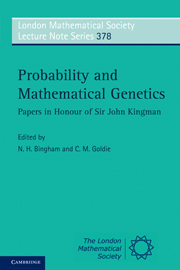Book contents
- Frontmatter
- Contents
- List of contributors
- Preface
- Bibliography of J. F. C. Kingman
- 1 A fragment of autobiography, 1957–1967
- 2 More uses of exchangeability: representations of complex random structures
- 3 Perfect simulation using dominated coupling from the past with application to area-interaction point processes and wavelet thresholding
- 4 Assessing molecular variability in cancer genomes
- 5 Branching out
- 6 Kingman, category and combinatorics
- 7 Long-range dependence in a Cox process directed by an alternating renewal process
- 8 Kernel methods and minimum contrast estimators for empirical deconvolution
- 9 The coalescent and its descendants
- 10 Kingman and mathematical population genetics
- 11 Characterizations of exchangeable partitions and random discrete distributions by deletion properties
- 12 Applying coupon-collecting theory to computer-aided assessments
- 13 Colouring and breaking sticks: random distributions and heterogeneous clustering
- 14 The associated random walk and martingales in random walks with stationary increments
- 15 Diffusion processes and coalescent trees
- 16 Three problems for the clairvoyant demon
- 17 Homogenization for advection-diffusion in a perforated domain
- 18 Heavy traffic on a controlled motorway
- 19 Coupling time distribution asymptotics for some couplings of the Lévy stochastic area
- 20 Queueing with neighbours
- 21 Optimal information feed
- 22 A dynamical-system picture of a simple branching-process phase transition
- Index
4 - Assessing molecular variability in cancer genomes
Published online by Cambridge University Press: 07 September 2011
- Frontmatter
- Contents
- List of contributors
- Preface
- Bibliography of J. F. C. Kingman
- 1 A fragment of autobiography, 1957–1967
- 2 More uses of exchangeability: representations of complex random structures
- 3 Perfect simulation using dominated coupling from the past with application to area-interaction point processes and wavelet thresholding
- 4 Assessing molecular variability in cancer genomes
- 5 Branching out
- 6 Kingman, category and combinatorics
- 7 Long-range dependence in a Cox process directed by an alternating renewal process
- 8 Kernel methods and minimum contrast estimators for empirical deconvolution
- 9 The coalescent and its descendants
- 10 Kingman and mathematical population genetics
- 11 Characterizations of exchangeable partitions and random discrete distributions by deletion properties
- 12 Applying coupon-collecting theory to computer-aided assessments
- 13 Colouring and breaking sticks: random distributions and heterogeneous clustering
- 14 The associated random walk and martingales in random walks with stationary increments
- 15 Diffusion processes and coalescent trees
- 16 Three problems for the clairvoyant demon
- 17 Homogenization for advection-diffusion in a perforated domain
- 18 Heavy traffic on a controlled motorway
- 19 Coupling time distribution asymptotics for some couplings of the Lévy stochastic area
- 20 Queueing with neighbours
- 21 Optimal information feed
- 22 A dynamical-system picture of a simple branching-process phase transition
- Index
Summary
Abstract
The dynamics of tumour evolution are not well understood. In this paper we provide a statistical framework for evaluating the molecular variation observed in different parts of a colorectal tumour. A multi-sample version of the Ewens Sampling Formula forms the basis for our modelling of the data, and we provide a simulation procedure for use in obtaining reference distributions for the statistics of interest. We also describe the large-sample asymptotics of the joint distributions of the variation observed in different parts of the tumour. While actual data should be evaluated with reference to the simulation procedure, the asymptotics serve to provide theoretical guidelines, for instance with reference to the choice of possible statistics.
AMS subject classification (MSC2010) 92D20; 92D15, 92C50, 60C05, 62E17
Introduction
Cancers are thought to develop as clonal expansions from a single transformed, ancestral cell. Large-scale sequencing studies have shown that cancer genomes contain somatic mutations occurring in many genes; cf. Greenman et al., Sjöblom et al., Shah et al. Many of these mutations are thought to be passenger mutations (those that are not driving the behaviour of the tumour), and some are pathogenic driver mutations that influence the growth of the tumour. The dynamics of tumour evolution are not well understood, in part because serial observation of tumour growth in humans is not possible.
In an attempt to better understand tumour growth and structure, a number of evolutionary approaches have been described.
- Type
- Chapter
- Information
- Probability and Mathematical GeneticsPapers in Honour of Sir John Kingman, pp. 91 - 112Publisher: Cambridge University PressPrint publication year: 2010
- 2
- Cited by



